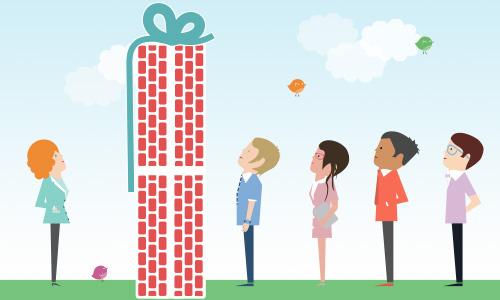Social & Peer to Peer Recognition Programs : Is Reward Getting In The Way?
As companies begin to place greater importance on employee recognition, I get to speak with, and on occasion assist, senior managers and directors. What often surprises me is how many still substitute a reward, for their own expression and feelings about an employee, they think a reward says it for them. I will put my cards on the table and say I think this is flawed, and research suggests I am not alone.
Many HR professionals are sceptical of the effectiveness of programs which focus on reward, as being the key driver. The Journal of Compensation and Benefits found in it’s research in 2010 that “less than 40 percent of HR managers, believe their rewards drive measurable impact on engagement.”
This is obviously looking at more than recognition based reward. However, employee recognition plays a key part in injecting day to day appreciation, and performance feedback, and is the accepted driver of engagement results, so getting the right positioning of recognition based reward will often make, or break your engagement strategy.
Unlike traditional methods which are going out with the ark, social and peer to peer recognition software, offer a sound management method that moves recognition from anecdotal morale-booster, to a software based data-driven business discipline. However, in order for recognition to be sustainable and effective, HR need to balance monetary recognition, be it cash, gifts, or vouchers, with day to day recognition and praise. Without the right balance, and a big push on positive employee expression, you just have a low frequency reward program, and the chances are you already have enough of those.
My experience is that too many managers and directors still think employee recognition is a reward transaction, not an extension of their own personality, and emotional commitment to the collective team, their employees. Dare I say, managers and directors are in the main, poor at recognition.
Recognition is an expression. Yes, it is a strong and unselfish personality trait, it makes work more rewarding, it says as much, if not more about the person giving it, than it does the recipient.
The principles of progressive social and peer to peer recognition programs are fairly simple, less rules, more trust, less what we think, and more what you think, wrapped up with a strong leadership narrative. To do that reward has to jump into the back seat, recognition is now the driving force.
HR have always had a difficult job determining where giving reward is the company’s friend, and when it’s the enemy, as we know it can be both. Take the dozens of bite size goodies that we see at work everyday, the little wins, they are mostly ignored due to a lack of engagement strategy and budget realities. The average employee recognition budget is currently 1.4% of total salary, which often includes false activity such as, sales incentives and Christmas gifts. I cannot see your board allowing a five or ten fold budget increase, to celebrate the valuable employee stories that take place every day.
If there is one stand out reason why social recognition is being held up as the future, it is purely because it understands the difference between recognition, and reward. One is vital, the other is occasional.
We know, we know, I hear you say. Encouraging and celebrating every employee in their journey towards personal, team, departmental, and most notably, company successes, has never seemed like rocket science to most. However, organisations have continued to let 99% of their employees positive working highlights go by unnoticed, and it is hardly a surprise that employee engagement is at an all time low.
This is changing however for many leaders, boosting employee engagement is enough of a reason to start investing in capturing the positives. The rest only need to look round the corner, or through the Glassdoor, and see that workplace transparency is upon us. What you do well, and who does it, matters, and you can’t reward it all.
Engagement strategies and an increasing desire for every employee, regardless of their position, to understand and work towards shared values and objectives, means recognition, and specifically social and peer to peer recognition programs are taking off. HR are at the heart of this change, as are employees, that’s right, employees are adopting social recognition in their droves, they get it. The real challenge sits with your managers and directors, they need to start giving vital recognition, and stop just handing out occasional rewards.


 30 ideas to help a new starter in their first week
30 ideas to help a new starter in their first week
 The value of external feedback in the workplace
The value of external feedback in the workplace
 Expand the power of recognition with Partner Appreciation
Expand the power of recognition with Partner Appreciation